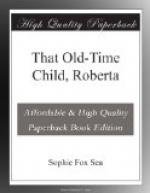Suddenly Polly broke away, pulled up an iron-weed growing on the road-side, and fell to whipping a large purple thistle. Her thirst grew; she left the thistle and fell to whipping the rank grass. Then was heard an angry buzz, as the assaulted bees swarmed out of their defenses and literally stormed her.
They settled all over her. Head, face, bare feet and legs were attacked all at once. They stung her terribly. The death of their comrade was summarily avenged. She rent the air with her cries, and backed toward Mam’ Sarah, fighting them off as she went from different parts of her body. Mam’ Sarah covered up her retreat as well as she could, saying:
“I natchel hate ter see fo’ks in trubble, but I ain’ er bit sorry fur you. I never seed ennybody fo’ that wuz allers on the war-paf. Them bees haden’ dun nuffin’ ter you. They is prezak lak humans. Ef you let ’em erlone you won’t hear from ’em; but fite ’em en they’ll fite you back, erver time.”
At the same time that Mam’ Sarah and Roberta were fussing over Polly, a line of glittering points were coming up the rise near the bend of the river. A column of Confederate soldiers appeared, marching shoulder to shoulder, their arms shining in the morning sun. On they came, crossing the fields with the springing step of hope and the steady step of high, dauntless courage, making directly for the works the Federals had thrown up and protected with the bodies of felled trees.
Well-nigh impregnable, those works, from their vast advantage of position, but in their line of march it was the policy of their leaders to fight every thing of like nature that came in the way, to hide, if possible, their real weakness in numbers. So they were told to take those works, and take them they would. Knowing not the hesitancy of doubt, nor the trammels of fear, what recked they of danger or of death, as they sprung to their work?
Alas! the awful death-trap that caught them, held them, while that deadly fusilade opened upon them, reddened with their warm, young blood the soil of their native State—mowed them down, ruthlessly, those hapless Kentuckians. For ruthless it ever seems, when youth and hope and glorious promise are offered in vain. At last they fell back, the living; what flesh and blood could do otherwise? Fell back, but undismayed, and fighting stubbornly inch by inch, as they bore off their wounded. O, those darlings of old Kentucky! whose light went out on that July morning nearly thirty years ago, those eager souls that God sealed with His eternal peace ere aught had ruffled them, other than the zest of a hurdle-race or quail hunt on their native bluegrass; many of them scarce passed the mile-stones of boyhood, fresh from the classroom and tender home circle. Yet, they plunged into the awful fire of that needless sacrifice, like veterans, to whom the smoke and crash of charging squadrons is a pastime.
No braver souls than they ever perished; none more loyal to the land that gave them birth. Well may Kentucky embalm their worth in enduring tablets of brass and marble. Let her see to it that she keeps their memory green in her heart, for they loved her with a love passing the love of woman.




